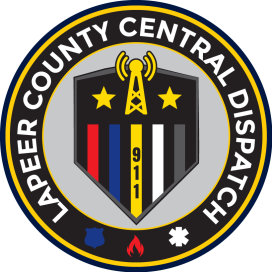What is 9-1-1?
9-1-1 is a universally recognized number to be used when reporting emergencies to police, fire or EMS. 9-1-1 is used throughout the United States, and is available in all 83 counties in Michigan. A 9-1-1 call can be made from any telephone at no charge. Including cellular phones, with or without basic service, and from pay phones.
What is Enhanced 9-1-1?
Enhanced 9-1-1 service provides the caller information as the call is answered within the dispatch center. 9-1-1 dispatchers are aware of the callers name, address, and call back phone number with this service. This saves valuable time in emergencies and preprograms the correct agency response for emergencies.
Who benefits from Enhanced 9-1-1?
In essence, everyone benefits from an enhanced 9-1-1 system. Especially our elderly citizens and children. If a caller is unable to speak (too young, too sick, seriously injured, or unable to speak English), the dispatcher will be able to send help because of the enhanced information with the call.
Why do we have a consolidated dispatch system?
It is important to understand that 9-1-1 phone service is only one of the many service components provided with such a system. In Lapeer County, all public safety response is coordinated through a single point of contact. Any need for police, fire, or EMS response is initiated and managed through Central Dispatch. In addition, these agencies can share in the state-of-the-art technology available at a much lesser cost.
What will 9-1-1 cost me?
Charges assessed to your phone bill for 9-1-1 service is determined by computing the operational budget for Central Dispatch with the available phone line count in the county. Each year this process audits the highest basic phone rate, phone line count, and the operational budget amount. Currently, the operational budget demand will require less than $1.55 per phone line, per month. This amount will decrease as growth and available line counts increase.
What can the 9-1-1 surcharge funds be used for?
Funds collected from the 9-1-1 surcharge can only be used for operational expenses. This includes employee wages, benefits, utilities, and system support costs.
Why have a 9-1-1 telephone surcharge, instead of assessing a tax millage?
A tax millage is a fee that would only be assessed to property owners. Therefore, property owners would be the sole source of funding for this essential service. By assessing a 9-1-1 telephone surcharge, all residents contribute to the funding of the countywide dispatch system.
Why do I have two 9-1-1 charges on my phone bill?
Listed on every phone bill are two different charges for 9-1-1 service. Technical Charges are authorized by the law, P.A. 32 of 1986, which are charges collected by the phone company to provide the 9-1-1 enhanced services. The second charge is the fee that must be authorized by voter approval for operational expenses.
Will I be paying an amount based upon my total phone bill each month?
No! The surcharge amount assessed to a phone bill is a set percentage of the highest basic phone service within the county. With nearly 50,000 lines in Lapeer County, residents will pay than $1.55 per month, per line. With continued growth in the line count for the county, there will be a reduction of the monthly charge.
Why do I pay 9-1-1 charges for a phone line used for Internet access?
Unfortunately, the phone company is not able to differentiate between the uses of phone lines. Therefore, these fees should be considered when making a decision to add a second line.
